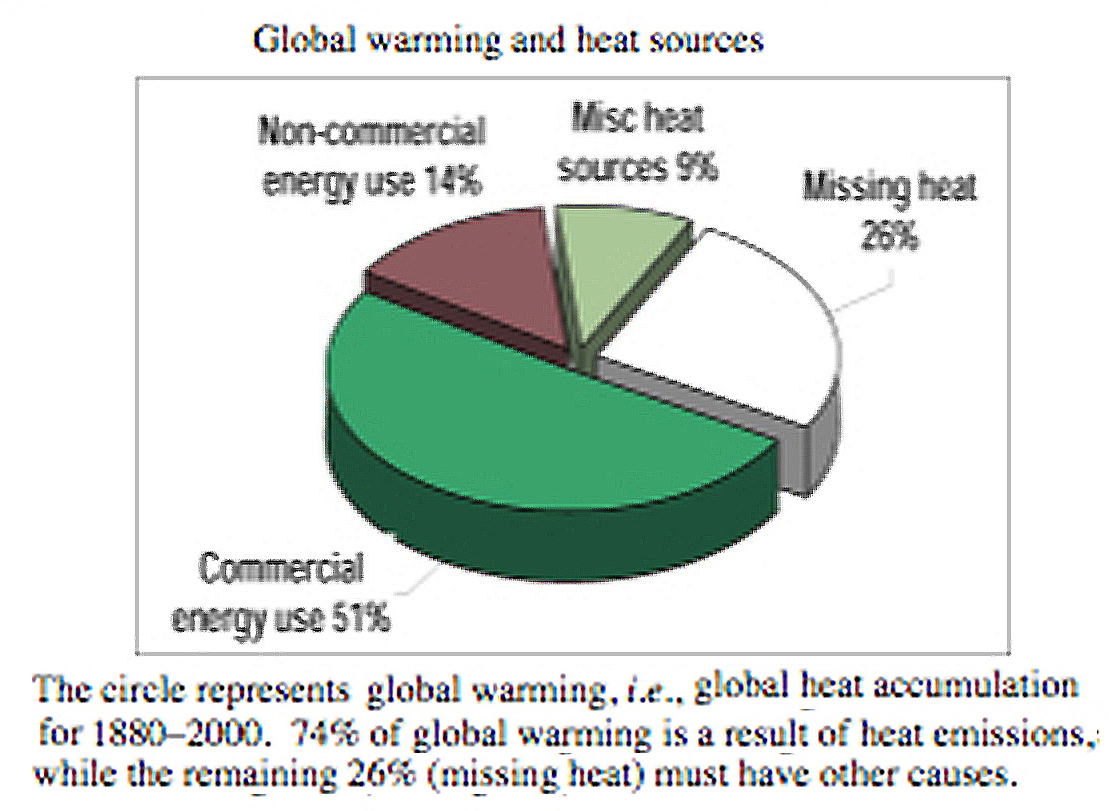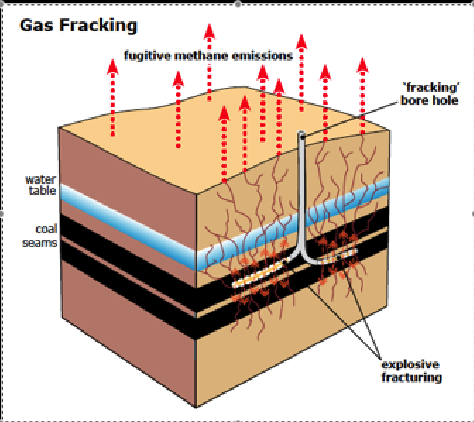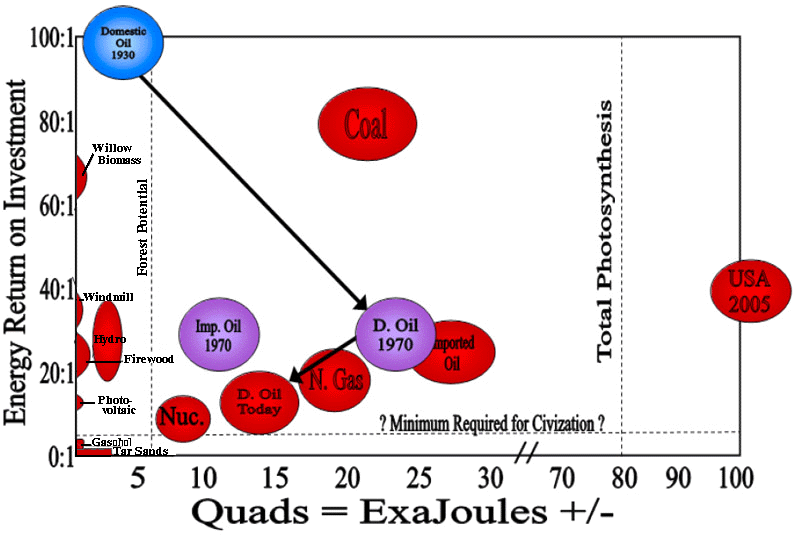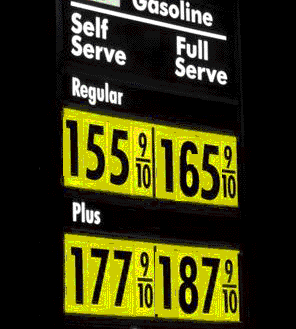
Eric R. Pianka According to Einstein's theory of relativity (E = mc2 ), mass is just highly condensed energy. This is why turning matter into energy via an atomic bomb or a nuclear power plant yields so much energy. From this perspective, we potentially have access to almost unlimited energy. Yet, it is perilous for us to use more energy because the resulting waste heat cannot be dissipated (Hansen et al. 2005). The figure below shows Nordell and Gervet's (2009) estimates of how much anthropogenic heat emissions have contributed to present day global warming. 
Long frozen fossil methane is being released from thawing permafrost and from the deep oceans at an ever accelerating rate. As temperatures rise, more methane bubbles up to the surface, further raising temperatures in an ever increasing positive feedback loop. Is there a critical "tipping point" at which the state of Earth's surface will change drastically, and if, so, what is it and when will it be reached? Some experts think this tipping point has already been crossed. Methane levels in Earth's atmosphere have more than doubled in the last few decades. This could well portend the onset of a powerful positive feedback loop that will almost certainly lead to very rapid global warming. We should be doing everything we can to KEEP this methane locked up in Earth's crust and frozen in the deep oceans. However, people seem to think we can live above the laws of nature and can use all the energy we "need" and want. Fracking cracks deep rocks releasing methane produced by anaerobes much of which vents to the surface and enters the atmosphere.  We are also deliberately extracting methane from ocean clathrates and BURNING it
for energy. Both fracking and clathrate mining release a lot of waste heat that
cannot be dissipated as well as adding more water vapor and carbon dioxide to the
atmosphere, further enhancing global warming. An international consortium involving Canada,
the US, Japan, India, and Germany is already extracting methane from
frozen methane clathrates and burning deep sea methane off the north
coast of Canada. The USGS has nine other similar
projects underway scattered around the world.
We are also deliberately extracting methane from ocean clathrates and BURNING it
for energy. Both fracking and clathrate mining release a lot of waste heat that
cannot be dissipated as well as adding more water vapor and carbon dioxide to the
atmosphere, further enhancing global warming. An international consortium involving Canada,
the US, Japan, India, and Germany is already extracting methane from
frozen methane clathrates and burning deep sea methane off the north
coast of Canada. The USGS has nine other similar
projects underway scattered around the world.
Moreover, fossil fuels are a finite resource and we are rapidly running out of them. As human populations burgeon and economies grow, demand for limited supplies has driven up the price of oil. An important facet is energy return on investment (EROI). In the 1930s, oil gushed out of wells and EROI was around 100:1 (blue circle at top left in the following graph). By 1970, EROI had dropped to about 30:1, but today domestic oil must be pumped out from depths at considerable cost (red ellipse near the bottom of the graph, EROI has fallen to about 10:1). Total energy consumption by the USA in 2005 is shown with the red ellipse at the far right which illustrates our extreme dependence on imported foreign oil. A minimum EROI above one is necessary for civilization to endure (horizontal dashed line). Two examples of energy sources that fall below this EROI line are shown: gasohol and tar sands. More energy is actually required to produce a gallon of ethanol than is returned when it is burned! Prohibitively huge amounts of energy will be needed to extract fossil fuel from Canadian tar sands. 
Some pseudo-scientists under the payroll of big oil assert that oil and natural gas supplies are adequate to get us through to the end of 2100, but no one knows how long dwindling supplies will last in the face of rapidly increasing world wide demand. Vast reserves of coal exist, but so-called "clean coal" is an oxymoron. Burning coal produces large amounts of pollutants and greenhouse gases. The future impact of global warming is coming up on us very fast. Burning of fossil fuels has released large amounts of carbon dioxide levels into Earth's atmosphere. By reflecting heat back to the planet that would otherwise radiate out into space, greenhouse gases such as CO2 and methane have warmed the Earth's land surface and oceans (see global warming). We must stop adding greenhouse gases to the atmosphere to slow global warming.  Americans are now suffering from painful increases in the cost of
gasoline at the pumps with no end in sight. People are clamouring for
alternative new sources of energy. Many seem to think that we do not
have to obey laws of thermodynamics. Using energy always produces heat,
and unless it can be dissipated, temperatures must rise.
Americans are now suffering from painful increases in the cost of
gasoline at the pumps with no end in sight. People are clamouring for
alternative new sources of energy. Many seem to think that we do not
have to obey laws of thermodynamics. Using energy always produces heat,
and unless it can be dissipated, temperatures must rise.
 Because people have electrical outlets all over their houses and
offices, they suffer from the illusion that electricity is clean energy,
infinite in supply and will always be there. None of these
assumptions is true -- unless we convert to an electrical system based on
renewable resources such as solar energy, power grids must ultimately fail
and the internet will cease to be. Whenever you turn on a light or an air
conditioner, chances are that coal is being burned to generate
the electricity you're using. A relatively small amount of electricity is
generated by other sources such as by wind, hydro-electric, and/or
solar energy. When you turn on a light, you are usually releasing solar
energy captured by plants millions of years ago -- essentially, you
are being illuminated by fossil sunlight that fell on the Earth long ago.
Unfortunately, electricity is difficult to store and usually must be used
immediately. Battery technology to improve our ability to store electric
energy has been painfully slow.
Because people have electrical outlets all over their houses and
offices, they suffer from the illusion that electricity is clean energy,
infinite in supply and will always be there. None of these
assumptions is true -- unless we convert to an electrical system based on
renewable resources such as solar energy, power grids must ultimately fail
and the internet will cease to be. Whenever you turn on a light or an air
conditioner, chances are that coal is being burned to generate
the electricity you're using. A relatively small amount of electricity is
generated by other sources such as by wind, hydro-electric, and/or
solar energy. When you turn on a light, you are usually releasing solar
energy captured by plants millions of years ago -- essentially, you
are being illuminated by fossil sunlight that fell on the Earth long ago.
Unfortunately, electricity is difficult to store and usually must be used
immediately. Battery technology to improve our ability to store electric
energy has been painfully slow.
Converting to a solar-powered electrical energy system would greatly reduce carbon emissions from the burning of non-renewable fossil fuels. Switching over to renewable sources of energy (wind and sun) would also make our electrical grid system more stable and reliable in the future (download Helmut Burkhardt's essay on energy technology). However, switching over to renewable energy is not nearly as simple and easy as many people might hope ( Renewable Energy: The Vision And A Dose Of Reality). Even if all humans stopped burning fossil fuels entirely right now, the planet will continue to warm for some decades. Earth simply cannot support all 7+ billion of us, certainly not in the energy-consuming style in which we'd like to live. Politicians are quick to promise energy solutions, but always by the year 2020 or 2050, too far into the future to alleviate pressing present problems. Moreover, they ignore the underlying causal problem: too many people. To keep spirits up, politicians and corporations invent and exploit expressions like "sustainable growth" and "sustainable development." People do not analyze these expressions, but prefer blissful ignorance vis-a-vis their meaning. However, stringing such antonyms together merely creates irresponsible oxymorons. Most people remain in a state of denial, impervious and oblivious to the impending crisis. Of course, humans are clever, so clever that we have actually figured out how to turn matter into energy by exploiting fission and fusion. Many people think that an unlimited supply of energy is therefore available. Nuclear energy may be virtually limitless, but it carries serious environmental hazards (particularly thermal pollution and radioactive waste). A few engineers see infinite energy prospects in beaming more solar energy from outer space to the planet's surface. A Japanese company is actually proposing to capture solar energy on the moon and transmit it to Earth. People just don't get it! Access to unlimited energy would lead to our downfall (see below). Unlimited cheap clean energy, such as that so ardently hoped for in the concept of cold fusion, would actually be one of the worst things that could possibly befall humanity. Such energy would enable well meaning but uninformed massive energy consumption and habitat destruction (i.e., mountains would be leveled and terraced, massive water canals would be dug, ocean water distilled, water would be pumped and deserts turned into green fields of crops). Human populations would grow even higher until the last vestiges of natural habitats are all destroyed. Heat dissipation would of course set limits, for when more heat is produced than can be dissipated, the resulting thermal pollution would quickly warm Earth's surface to the point that all life is threatened, perhaps the ultimate ecocatastrophe. Even if humans were not adding vast amounts of excess heat by burning non-renewable fossil fuels and running nuclear reactors, Earth can no longer dissipate the heat it receives from normal incident solar radiation fast enough to stay in balance ( Hansen et al. 2005). Waste heat generated from burning fossil fuels and nuclear reactors only adds insult to injury. If humans are to survive, we will have to develop a sustainable system where each of us leaves the planet in the same condition that it was in before we were born. This will require many fewer of us and much less extravagant lifestyles. We won't be able to move around so freely (airplanes will become a thing of the past) and we will have to go back to walking and riding bicycles and horses. In addition, people will have to be more spread out, living without big cities. Before it is all over, we are going to have to limit our own reproduction, control human greed, un-invent money, revert back to trade and barter, and grow our own crops, among other things. Links: |